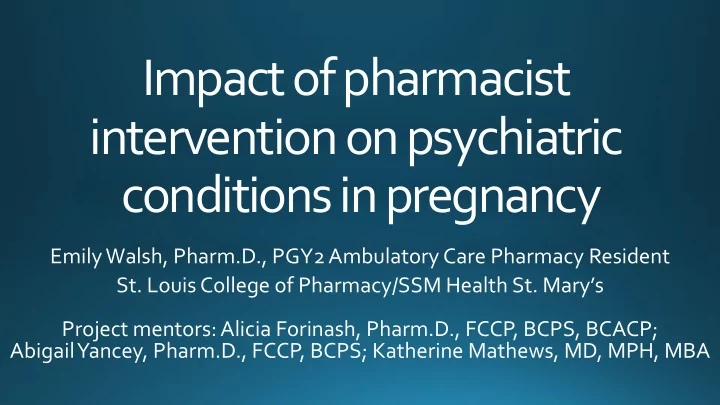

Impact of pharmacist intervention on psychiatric conditions in pregnancy Emily Walsh, Pharm.D., PGY2 Ambulatory Care Pharmacy Resident St. Louis College of Pharmacy/SSM Health St. Mary’s Project mentors: Alicia Forinash, Pharm.D., FCCP, BCPS, BCACP; Abigail Yancey, Pharm.D., FCCP, BCPS; Katherine Mathews, MD, MPH, MBA
Background
Fetal outcomes Maternal outcomes • Preterm birth • Stress • Low birth weight • Prolonged labor • Decreased growth • Forced delivery • Spontaneous abortion • Impaired bonding • Decreased developmental scores • Decreased social support • Cardiovascular defects • Increased use of tobacco, alcohol and illicit substances • Perstistent pulmonary hypertension • Suicide • Increased neonatal cortisol and catecholamine levels • Poor adherence to postpartum care
Objective To measure the impact of clinical pharmacy services in the management of psychiatric conditions in pregnancy
Inclusion criteria Exclusion criteria • Seen in SSM Health St. Mary’s • Declined participation Maternal Fetal Care Center (MFCC) • Did not complete study follow up • Pregnant women 18 years of age or • Previous visits with clinical older or postpartum pharmacy team for assessment of • <35 weeks gestational age unless depression, anxiety or bipolar postpartum disorder during this pregnancy • Suspected diagnosis of depression, • Women and Infant Substance Help anxiety and/or bipolar disorder (WISH) Center patient • English or Spanish speaking
Follow up with Telephone call Visit with Identify patients pharmacy team pharmacy team (1 week) (at least 3 weeks) Past medical Informed Medication Standard history consent pickup visit Medication Standard Adverse drug EPDS list visit reactions Provider Answer Satisfaction EPDS referral questions survey EPDS: Edinburgh Postnatal Depression Scale
Descriptive Paired t-test Descriptive
Descriptive
10 patients currently enrolled 6 patients completed follow-up
n (%)* Age - mean 29.8 Ethnicity African American/Black 5 (83.3) Caucasian 1 (16.7) Level of care High risk 3 (50) Low risk 3 (50) Gestational age – mean 17 weeks, 2 days 1 st trimester 3 (50) 2 nd trimester 2 (33.3) 3 rd trimester 1 (16.7) Gravidity – mean 4 Primiparous 1 (16.7) Multiparous 5 (83.3) *unless otherwise noted
Comorbidities n (%)* Psychiatric diagnosis n (%)* # comorbidities - mean 4.8 # psych diagnoses - mean 2.5 Obesity 4 (66.7) Depression/PPD 4 (66.7) History of poor 3 (50) Anxiety 3 (50) pregnancy outcome^ Nausea/vomiting 3 (50) Bipolar 3 (50) HTN 2 (33.3) Trauma 2 (25) Asthma 2 (33.3) Other (all n = 1): PTSD, ADHD, schizoaffective Other (all n = 1): DM/GDM, HIV, disorder, borderline personality, antisocial fibromyalgia, migraine, chronic pain, personality anemia, brain cyst *unless otherwise noted ^Poor pregnancy outcome: c-section, preterm delivery, polyhydramnios DM: diabetes, GDM: gestational diabetes, HTN: hypertension, PPD: postpartum depression, ADHD: attention deficit hyperactivity disorder
1 antidepressants: SSRI, SNRI 2 mood stabilizer: lamotrigine
n (%) Stop/taper inappropriate medications - Start new medications 14 (18.7) Psychiatric medication 3 Acute PG issues, prenatal vitamin 7 Asthma, smoking cessation 3 Aspirin 1 Medications in list but no longer active 26 (34.7) Medications not listed in list but currently taking 1 (1.3) Other Vaccinations 15 (20.0) Labs 3 (4.0) Patient education* 12 (16.0) Refer to specialist 4 (4.0) TOTAL 75
n (%) Stop/taper inappropriate medications - Start new medications 1 (3.2) Medications in list but no longer active - Medications not listed in list but currently 1 (3.2) taking Other Vaccinations 14 (45.2) Labs - Patient education 12 (38.7) Refer to specialist 3 (9.7) TOTAL 31
Psych – n (%) Non-psych – n (%) Stop/taper inappropriate - -- medications Start new medications 4 (3.8) 11 (10.4) Medications in list but no longer - 26 (24.5) active Medications not listed in list but - 2 (1.9) currently taking Other Vaccinations -- 29 (27.4) Labs 2 (1.9) 1 (0.9) 12 (11.3) Patient education 12 (11.3) Refer to specialist 2 (1.9) 5 (4.7) TOTAL (n = 106) 20 (18.9) 86 (81.1)
Change in EPDS from baseline to follow up 14 p = 0.34 12 EPDS score (mean) 10 8 Initial 13.1 10.7 Follow-up 6 4 2 0 *EPDS >10 is considered uncontrolled
Assessment of mood by MD/NP/Pharm.D Assessment of mood by MD/NP/Pharm.D Initial visit (n = 6) Follow-up visit (n = 6) Uncontrolled Uncontrolled 33% 33% Controlled Controlled 67% 67%
Assessment of EPDS Assessment of EPDS Initial visit (n = 6) Follow-up visit (n = 6) Controlled 33% Controlled Uncontrolled 50% 50% Uncontrolled 67% Of patients that were uncontrolled at baseline, 50% (n = 2) experienced a clinically significant change at follow-up
Change in patient reported mood from baseline to follow-up 6 Patient reported mood (mean) 5 4 Initial 3 Follow-up 3.8 4.8 2 1 0 *Scale of 1 to 10 with 1 being the best
Many recommendations were made by the pharmacy team to provide comprehensive care to patients Trend towards improved EPDS scores and control of obstetrics patients with psychiatric conditions Patients were satisfied by the care provided by the pharmacy team
Strengths Limitations • Contribute to the body of • Lower than anticipated evidence related to study enrollment due to pharmacist management COVID-19 of psychiatric conditions • Lack of comparator group and obstetrics patients • Poor follow-up • Quantify impact of current standard of care at MFCC
Provide recommendations and education to the Continue enrollment healthcare team on how to best care for patients with mood disorders
Impact of pharmacist intervention on psychiatric conditions in pregnancy Emily Walsh, Pharm.D., PGY2 Ambulatory Care Pharmacy Resident St. Louis College of Pharmacy/SSM Health St. Mary’s Project mentors: Alicia Forinash, Pharm.D., FCCP, BCPS, BCACP; Abigail Yancey, Pharm.D., FCCP, BCPS; Katherine Mathews, MD, MPH, MBA
Recommend
More recommend